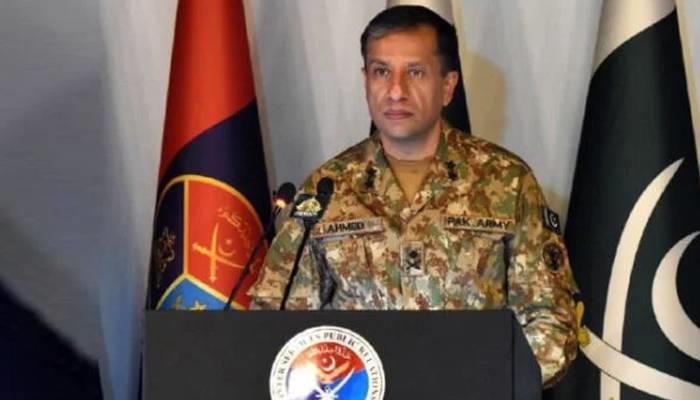
Lt Gen Ahmed Sharif Says KP Paying The Price For Space Given To Militants
Pakistan Army spokesperson Lt Gen Ahmed Sharif Chaudhry on Friday warned that the ongoing wave of terrorism in Khyber Pakhtunkhwa was the outcome of years of deliberate neglect, political expediency, and the space given to militants and their facilitators.
Addressing a press briefing in Peshawar, the Director General of Inter-Services Public Relations (ISPR) said that governance and public welfare in the province had been intentionally weakened, and the people of Khyber Pakhtunkhwa were now paying the price for those decisions with their blood.
He said Afghanistan must not be allowed to become a sanctuary for terrorists, adding that Indian proxies operating from Afghan soil were actively engaged in orchestrating attacks against Pakistan, for which clear evidence existed.
According to the DG ISPR, 135 foreign militants were killed while infiltrating from Afghanistan during the past two years, and 30 Afghan nationals were involved in suicide attacks.“These figures prove that India is using Afghan territory as a base camp for terrorism against Pakistan,” he remarked.
Lt Gen Chaudhry identified five primary factors behind the persistence of terrorism:
1. Incomplete implementation of the National Action Plan (NAP),
2. Political point-scoring and vested interests on the issue of terrorism,
3. India's use of Afghanistan as a launching pad for anti-Pakistan activities,
4. Availability of modern weapons and safe havens to militants in Afghanistan, and
5. The nexus between terrorists and criminal networks under local and political patronage.
He stressed that the full implementation of NAP's 14 points was imperative, lamenting that political statements and personal interests had taken precedence over national security. He said judicial proceedings in terrorism-related cases remained extremely slow, adding that no terrorist had been convicted by anti-terrorism courts in Khyber Pakhtunkhwa so far this year.
Sharing judicial data, he said over 10,000 narcotics cases had been registered across the province, but only 679 culprits were convicted. Likewise, out of 33,000 cases related to illegal arms, only 6,945 resulted in convictions.
Lt Gen Chaudhry emphasized that the eradication of terrorism required every institution to fulfill its responsibility.“The Pakistan Army and other security forces are conducting intelligence-based operations on a daily basis to ensure lasting peace in the country,” he said.
He warned that the failure to implement previously agreed decisions had emboldened terrorists, adding that talking about negotiations with such elements was tantamount to dishonoring the sacrifices of martyrs.“Do we not hear voices calling for dialogue with terrorists?” he asked.“Is every problem solved through talks? When India fired missiles on Pakistan on May 6 and 7, targeting innocent children, women, mosques, and madrassas, did anyone suggest holding talks the next day?”
He said if dialogue could solve every issue, there would have been no battles, no expeditions, and no wars in history.“Remember the Battle of Badr, when the Holy Prophet (PBUH) faced his own tribesmen and relatives, yet stood firm for truth,” he added.
The military spokesperson said that instead of building a unified national narrative against terrorism, misleading narratives were being propagated for political gain. He said political leaders and provincial governments had themselves decided to dismantle the nexus between militancy and organized crime, including narcotics, extortion, kidnapping for ransom, and the smuggling of non-custom paid vehicles. However, whenever law enforcement agencies took action, certain political and local elements stepped forward to shield these groups.
Lt Gen Chaudhry noted that the judicial system had also suffered due to this nexus. As of August 2025, no terrorist had been convicted by anti-terrorism courts in the province. Currently, 34 terrorism cases are under trial, 2,878 cases have been pending for less than three years, while 1,706 cases have been pending for more than three years.
He said despite earlier decisions in 2014 and 2021 to strengthen the Counter-Terrorism Department (CTD) in Khyber Pakhtunkhwa, its operational capacity still comprised only 3,200 personnel.“We salute the brave police and CTD officers of Khyber Pakhtunkhwa, but their current manpower is insufficient to meet the challenge,” he added.
The DG ISPR further said that under NAP, the registration and reform of religious seminaries were also decided, but so far, only 4,355 - or 55 percent - of madaris in the province had been registered.“If registration itself remains incomplete, how can uniformity in curriculum and oversight mechanisms be ensured?” he asked.
Concluding his address, Lt Gen Ahmed Sharif Chaudhry underlined that Pakistan's security and stability depended on the full implementation of the National Action Plan, judicial reforms, and the strengthening of law enforcement institutions.

Legal Disclaimer:
MENAFN provides the
information “as is” without warranty of any kind. We do not accept
any responsibility or liability for the accuracy, content, images,
videos, licenses, completeness, legality, or reliability of the information
contained in this article. If you have any complaints or copyright
issues related to this article, kindly contact the provider above.
Most popular stories
Market Research

- Crypto Market Update: Pepeto Advances Presale With Staking Rewards And Live Exchange Demo
- Kucoin Appeals FINTRAC Decision, Reaffirms Commitment To Compliance
- Cregis And Sumsub Host Web3 Compliance And Trust Summit In Singapore
- Chartis Research And Metrika Release Comprehensive Framework For Managing Digital Asset Risk
- Nodepay Launches Crypto's Largest Prediction Intelligence Platform
- Schoenherr Opens London Liaison Office As Gateway To Central Eastern Europe




















Comments
No comment